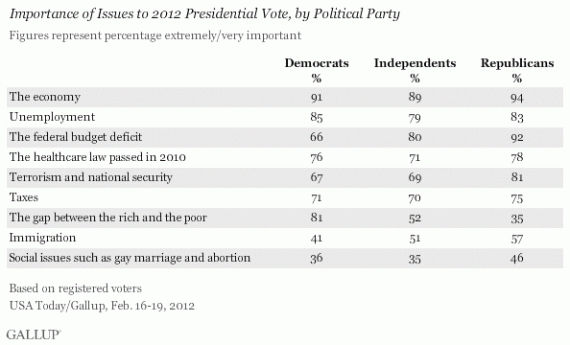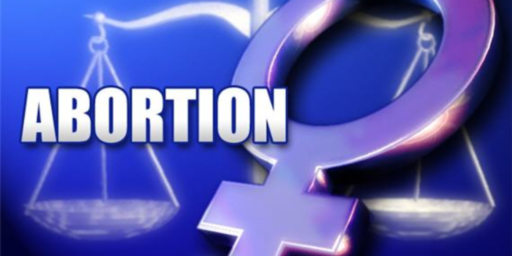It’s Still The Economy, Stupid. Social Issues Last On Voters’ Priority List
Despite all the time the media, pundits, and Presidential candidates seem to be spending talking about social issues, voters are still saying the economy is the most important issue:
PRINCETON, NJ — More than 9 in 10 U.S. registered voters say the economy is extremely (45%) or very important (47%) to their vote in this year’s presidential election. Unemployment, the federal budget deficit, and the 2010 healthcare law also rank near the top of the list of nine issues tested in a Feb. 16-19 USA Today/Gallup poll. Voters rate social issues such as abortion and gay marriage as the least important.
The high ranking of economic issues in the list is no surprise in a down economy. The rank order also mirrors the priority given to the economy, unemployment, and the deficit when Americans are asked to name the most important problem facing the country.
In fact, however, Americans have always rated the economy as a very important election issue. Even when the economy was relatively strong, as in the 1996, 2000, and 2004 elections, close to 9 in 10 said the economy was an extremely or very important issue to their vote, though fewer said it was extremely important in those years.
And the priorities don’t change much when you break things down by political affiliation:
 So, how about we all shut up about abortion, contraception, and all that other pointless nonsense and talk about what really matters? Deal?
So, how about we all shut up about abortion, contraception, and all that other pointless nonsense and talk about what really matters? Deal?






Because what can the executive branch really do about the overall unemployment rate in the short and intermediate time frame? What can the executive branch really go about economic growth in the short term?
Also, it should be obvious that Americans really do not care about the national debt or budget deficits. What voters really care about is what goodies are they going to get from the government and who is going to pay for it. Voters are very consistent in punishing any politician who succeeds in cutting spending.
What is wrong in politics today is that the voters have an appetite for $4 trillion in government spending but have no desire to pay $4 trillion in taxes. No politicians wants to make the voters mad by cutting spending and no one runs for office to make real, substantial cuts because there is nothing fun or exciting about cutting budgets.
I love how the poll treats “the economy” and “unemployment” as different categories.
I wonder which political party convinced large numbers of voters that they could have their cake and eat it too? Hmm. Which party came up with the idea that you could cut taxes and increase revenue (above the pre-existing trend)?
This is indeed a problem. So is your favorite topic: demographics. We have a large group of people who are ageing and who will – temporarily but significantly – put massive strain on medicare and (to a lesser extent) social security. We also spend too much on our military, but that’s secondary to the medicare issue. Our budgetary problems are overwhelmingly a question of how we’re going to pay for healthcare.
One party has consistently shown an interest in reforming how we handle healthcare. The other has been worse than useless: from Medicare part D to their abrupt about-face on the value of Obamneycare. The Democrats have their problems, of course. How nice would it be if we had a decent 2nd party that was willing to address the problems of the day constructively (for instance, Wyden-Bennett could have been seriously pushed, but it wasn’t. The moment the media started to talk about it, the GOP sponsors dropped it like a bad habit).
But we don’t have that. And you, Supe, are a perfect illustration of why. All you have is resentment and despair.
I don’t for a moment claim that economic issues don’t generally top the list of voters concerns but this is a childishly simplistic analysis of how politics works in practice. Or why else are Republicans so fond of promoting wedge issues as a means of energizing their base. And it’s true on the other side. You don’t think for example Walker’s campaign against the unions in WI isn’t going to be a factor in the fall. Or these campaigns to impose vaginal inspections on women or limit access to contraceptives are not going to be used to energise women voters. The average woman is going to be much motivated about something she perceives as an attack on her health than the federal deficit. Voting patterns and voting coalitions are a lot more complicated than this chart suggests.
Trying to remove all of the drama about social issues from politics would be like trying to remove all of the whiskey out of Boston and the Botox out of Beverly Hills. That’s especially the case in connection with a contested GOP primary contest, in which the most fervent participants inevitably are a collection of dissociative Bible bots.
Regarding the general electorate, it goes without saying the economy by far is the most important issue. That would be the case even in a good economy, much less in the flaming train wreck (on Main Street, not in SoHo) with which the country has been saddled.
I think Romney agrees…which is why he tried to back away from the contraception issue…but the silly folks with tea bags dangling from their tricorns dragged him right back into it.
Of course he doesn’t have anywhere to go on the economy either. He was dead wrong on the auto-bailout. Romneycare is very successful…but he can’t run on it. He says we need a “recovery from the recovery” on the same day the Dow closes at 13K and the GDP and personal income numbers get bumped up.
The Republicans have banked their entire 2012 prospects on the economy being bad and have done their best to keep it bad…the debt ceiling debacle…austerity in a recovery…etc. Right now the biggest threat to the recovery is war with Iran. Oh wait…they are beating the drums for that as we speak.
Holy shit…Breitbart died at age 43? I guess pathological lying does has physiological consequences.
Related:
The title of the post is When Did Republicans Become Fiscally Irresponsible?
It highlights the inner bankruptcy of current GOP economics. They say “Obama will make us Greece” while putting out plans that will make us Greece … or at least Italy.
@Tsar Nicholas II:
Trainwreck? Maybe at the end of 2008 but no longer. GDP is above pre crash levels, they just revised 2011Q4 up to 3%, the auto market will be around 14 million this year, unemployment is falling steadily, the Dow is up 100% from the bottom, bank lending is climbing. The problems are still a housing market in the tank and too large unemployment. But a trainwreck is hyperbole…they’re not buying 14 million autos in Soho.
@ JP…
And in the real world Obama is proposing historic debt reduction plans.
The headline should read:
It started in the 80s. Reagan. But even he looked at the results and decided to add more revenue.
Bush the Elder tried to be fiscally responsible. It cost him. Since then, it’s been tax cut fairies all the way down.
@Rob in CT:
I actually think Reagan-the-man was trying, but there is no doubt that his administration netted out with a deficit.
And after all, the Clinton administration surplus was attainable just a few short years after.
In each case Congress played a role.
@Rob in CT:
I voted for Bush the Elder 😉
I wonder about the validity (in the statistical sense) of polls like this. Just because people say that issue X is more important to them than issue Y, is that really true when it comes to how they actually cast a vote? It would be interesting if someone could some come up with some sort of econometric model to figure out which issues are really driving it, because I suspect there’s a difference between what most people claim drives their behavior and what actually does.
Most people are very emotion driven, and even if rationally the economy ought to be more important, it’s those social issues that trigger emotional responses.
@Stormy Dragon:
It is quite possible, not its certain, that the poll and voting are going to engage different parts of the brain.
We’ve all done those web-apps that ask us policy questions and then tell us the closest-match in candidates, right? How many of us supported that candidate?
(Maybe it’s the apps fault, but I remember being told I should support Hillary.)
Because it’s to Obama’s advantage to remind the electorate how batshit insane his opponents are.
It’s not even as if he’s trying to at this point, but he wouldn’t be much of a politician if he was a lousy opportunist.
Hey Doug, I think it’s about time for another column on gay marriage. Oh wait, there it is.
You know…I would just as soon not talk about contraception.
But then the Senate takes up the Republican anti-contraception bill.
I mean…if Republicans want to make women’s access to contraception an issue…then it’s an issue that we need to talk about.
Republicans want to TAKE THE COUNTRY BACK…to the 19th century. Voters have a choice.
@john personna:
Because the app assumes most people decide who to vote for by deciding what they believe on various issues, and then selecting the candidate that most closely matches that position. This may be true for some part of the population (particularly people like you find here who spend a lot of time arguing over policy issues), but for most people I think it actually works the other way. They have either a positive or negative reaction to a candidate and then find points of agreement or disagreement to justify that first impression. And the issues that feed into that initial reaction are likely quite different from their rational ranking of which issues are most important.
You got that right!
You also opened the door for my slightly off topic comment.
I have been pondering filing a claim for Social Security Retirement Benefits for two years.
The best advice I could get from citizens who are currently receiving their entitlement was “sign up early.” One fellow stated that I should be prepared to wait as long as three months for my first benefits.
Well I finally went down to the local Federal Building in Sleepytown Tuesday afternoon (Feb. 28) and enrolled. I was told I could expect my first benefits to be deposited Wed. Mar. 14 and then every second Wednesday of the month thereafter.
As I left the building I felt like I had just stepped one foot in the grave.
Two weeks! I’ll believe it when I see it! This is the US Government I’m dealing with after all.
Today, Thursday, Mar. 1 when I logged on to my checking account THE MONEY WAS THERE!
Less than 48 hours after my application was accepted the first deposit was made!
I called the Social Security office to be sure this was not an error and the gal on the phone couldn’t believe it either. She said it was “very unusual.”
I can not count how many times I have heard that Social Security would be broke by the time I retired and I would not collect anything. I am sure the first time was before I started High School 50 years ago.
Well I guess I beat the odds. Or maybe this is more evidence to support my contention that the doomsayers are just full of it!
But aside from people who say things like “drill here, drill now”, economic issues tend to be very complex to understand and very difficult to legislate on.
Social issues tend to be easier to have black and white discussions on and it’s easier to pass legislation. It’s easy (relatively) to write a law that makes marriage one man and one woman, or makes abortion illegal.
It’s not easy to write a law that *poof* makes the economy better. Even if you can say that, for example, repealing Sarbannes-Oxley would make things better, it’s likely to have a very small effect today. Banning abortion effective tomorrow would have an immediate impact.
The President is and was always going to stand or fall on the state of the economy, no matter what extraneous foolishness the Republicans brought up. Obama defended deficts which were critical to the admittedly weak recovery we’ve been in for the last two years and that more than birth certificates or women keeping their legs closed will determine his political fate.
@Ben Wolf:
The lousy economy didn’t stop Bush from being reelected. For a large part of the country, people simply had a bad visceral reaction to Kerry, so they voted Bush. Likewise in 2008, most people simply liked Obama better than McCain. Unless the economy gets noticeably worse between now and November, I think it’s ultimately going to come down to whether people like Obama or whomever better.
@Stormy Dragon: We didn’t have a lousy economy in 2004. It wasn’t gangbusters but unemployment was relatively low and multiple market bubbles had yet to burst.
@Stormy Dragon:
Firstly the economy wasn’t bad in 2004 it was on the lower slopes of one of the biggest bubble economies ever and secondly people didn’t have a particularly bad visceral reaction to Kerry. Bush won by the narrowest margin for an incumbent since Wilson in 1916. Rove simply ran a superb campaign before the scales had fallen from people’s eyes over Iraq. He neutralised any support Kerry might have had amongst the nationalists by smearing him and producing the greatest Republican turnout in history which has not been equalled since.
The US has some major problems that candidates need to address:
Parents that have children and then abandon them to relatives, friends, neighbors, or just anyone.
Violence and abuse aimed toward women and children: look at the increasing number of shelters for the abused – weird ridiculous shameful!
Obscene salaries of “professional athletes” and “entertainers” that are beyond our imagination.
CEO’s who lay off workers while collecting millions in bonuses.
Judges who show more concern for criminals than the suffering of their victims.
Corporations that gouge the public as they raise prices on needed staples: gasoline, food, drinks.
(and the investors that drive up the price of gas – let them invest in GM or pork bellies)
Elected officials who have no shame and openly carry on affairs while married.
This is not some sort of religious statement, even though most religious groups would agree with my statements above and that this country is in a decline morally, while values have gone out the window. Could it be that this lack of values is affecting the economy? Our leaders need to speak honestly and openly to the American people about this.
Today’s WSJ reported on the recovery picking up steam, the market being up on a better than expected unemployment report, lending picking up, and Detroit having another strong month.
All the GOP has left to peddle is crazy.
Well, a lot of them thought McCain seemed unstable and wondered why a sane person would even consider putting an nitwit like Palin a heartbeat away from the Presidency.